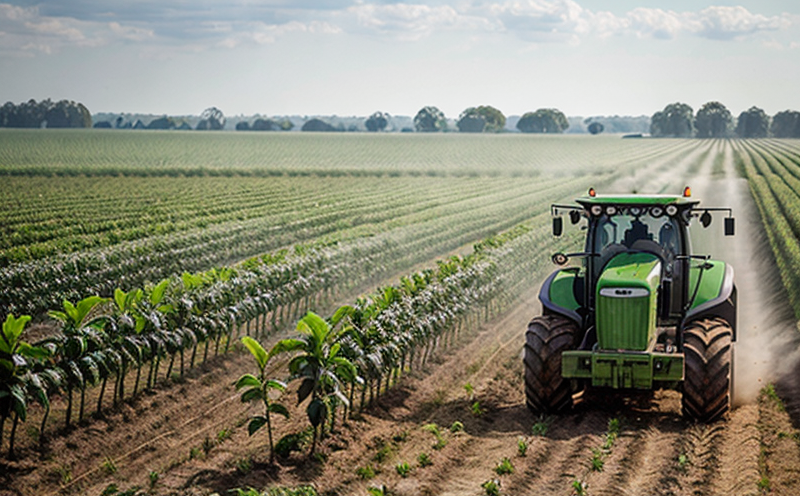NF EN 12393 Agricultural Residue Testing of Oily Products
The NF EN 12393 standard is specifically designed to analyze agricultural residues in oily products, ensuring food safety and compliance with international standards. This service is crucial for manufacturers dealing with edible oils, fats, and other plant-based products derived from agricultural sources. The testing process ensures that any agricultural residues such as soil particles or plant materials do not exceed permissible limits set by regulatory bodies.
The NF EN 12393 standard is particularly relevant in the context of global supply chains where transparency and traceability are paramount. By adhering to this standard, manufacturers can demonstrate their commitment to quality and safety, thereby enhancing consumer trust. This service supports various sectors including food processing, oil refining, and agricultural product manufacturing.
The testing procedure involves several steps: sample collection, preparation, analysis using advanced spectroscopic techniques, and finally, reporting the findings against set thresholds. Sample preparation is critical as it ensures accurate results. The standard specifies detailed methods for sieving, washing, and drying samples to remove non-target materials before analysis.
Advanced instrumentation plays a vital role in NF EN 12393 testing, including but not limited to near-infrared spectroscopy (NIR) and X-ray fluorescence (XRF). These tools enable precise quantification of agricultural residues down to minute levels. The use of such sophisticated technologies ensures high accuracy and reliability, which is essential for regulatory compliance.
The acceptance criteria are stringent, with thresholds defined by the standard itself. Any detected residue exceeding these limits indicates a potential issue that needs immediate attention. It's important to note that exceeding permissible limits can lead to product recalls or even legal actions, emphasizing the necessity of thorough testing at every stage of production.
Regular monitoring and adherence to NF EN 12393 not only protect consumer health but also help maintain brand reputation. In today’s competitive market, maintaining stringent quality standards is key to sustaining customer loyalty and attracting new clients.
Scope and Methodology
| Scope of NF EN 12393 | Description |
|---|---|
| Sample Collection | Involves proper identification, sampling, and documentation to ensure representativeness. |
| Preparation | Includes sieving, washing, drying, and homogenization of samples for consistent analysis. |
| Analytical Techniques | Utilizes NIR spectroscopy and XRF for accurate residue quantification. |
| Acceptance Criteria | Defines permissible limits for agricultural residues to ensure safety and compliance. |
| Sample Preparation Steps | Description |
|---|---|
| Sieving | Removes larger particles that do not contribute to the residue content. |
| Washing | Cleans away non-target materials, ensuring purity of the sample for analysis. |
| Drying | Reduces moisture content without affecting the residue composition. |
| Homogenization | Makes the sample uniform to ensure consistent results across multiple tests. |
Environmental and Sustainability Contributions
- Avoiding contamination of agricultural residues reduces waste in production processes.
- Precise residue detection helps in optimizing resource use, thus minimizing environmental impact.
- Ensuring compliance with standards like NF EN 12393 supports sustainable practices by preventing harmful substances from entering the food chain.
The service also contributes to reducing waste and promoting efficient utilization of resources. By identifying and removing agricultural residues early in the production cycle, manufacturers can minimize downstream costs associated with rework or product recalls due to non-compliance.
Furthermore, adherence to this standard fosters a culture of sustainability within organizations, encouraging them to adopt more environmentally friendly practices throughout their supply chains. This not only benefits individual companies but also contributes positively to broader environmental goals.
Competitive Advantage and Market Impact
Agricultural Residue Testing using NF EN 12393 provides significant competitive advantages for businesses operating in the food processing, oil refining, and agricultural product manufacturing industries. Compliance with international standards enhances credibility among stakeholders including customers, regulators, investors, and partners.
Customers appreciate products that meet stringent quality criteria, leading to increased sales volumes and market share growth. Regulatory bodies are more likely to approve products tested according to NF EN 12393, reducing the risk of regulatory non-compliance penalties.
Investors view adherence to international standards favorably, often associating it with higher levels of corporate governance and better management practices. Partnerships become easier as companies demonstrate their commitment to quality and safety through consistent testing protocols like NF EN 12393.





